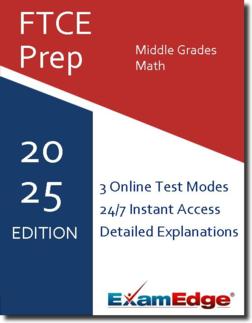FTCE Middle Grades Math (025) Practice Tests & Test Prep by Exam Edge - Topics
Based on 40 Reviews
- Real Exam Simulation: Timed questions and matching content build comfort for your FTCE Middle Grades Math test day.
- Instant, 24/7 Access: Web-based FTCE Middle Grades Mathematics 5-9 practice exams with no software needed.
- Clear Explanations: Step-by-step answers and explanations for your FTCE exam to strengthen understanding.
- Boosted Confidence: Reduces anxiety and improves test-taking skills to ace your FTCE Middle Grades Mathematics 5-9 (025).

Understanding the exact breakdown of the FTCE Middle Grades Mathematics 5-9 test will help you know what to expect and how to most effectively prepare. The FTCE Middle Grades Mathematics 5-9 has 70 multiple-choice questions The exam will be broken down into the sections below:
| FTCE Middle Grades Mathematics 5-9 Exam Blueprint | ||
|---|---|---|
| Domain Name | % | Number of Questions |
| Knowledge of problem-solving and reasoning skills | 13% | 9 |
| Knowledge of mathematical manipulatives and models and instructional technology | 6% | 4 |
| Knowledge of assessment in mathematics | 9% | 6 |
| Knowledge of connections among mathematical concepts | 7% | 5 |
| Knowledge of number sense, operations, and proportionality | 9% | 6 |
| Knowledge of foundations of algebra | 14% | 10 |
| Knowledge of algebraic thinking | 11% | 8 |
| Knowledge of data analysis, statistics, and probability | 7% | 5 |
| Knowledge of two-dimensional geometry | 15% | 11 |
| Knowledge of measurement and spatial sense | 9% | 6 |


